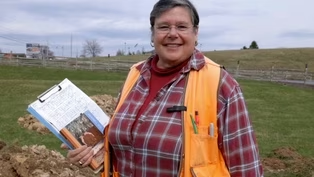Careers that Work
Soil Scientist
Season 1 Episode 4 | 3m 50sVideo has Closed Captions
Learn the skills and training necessary to enter the career path of a soil scientist
Laurel Mueller, Soil Scientist & President of Soil Services Company, Inc., explains the skills and training necessary to enter the career path of a soil scientist.
Problems playing video? | Closed Captioning Feedback
Problems playing video? | Closed Captioning Feedback
Careers that Work is a local public television program presented by WVIA
Careers that Work
Soil Scientist
Season 1 Episode 4 | 3m 50sVideo has Closed Captions
Laurel Mueller, Soil Scientist & President of Soil Services Company, Inc., explains the skills and training necessary to enter the career path of a soil scientist.
Problems playing video? | Closed Captioning Feedback
How to Watch Careers that Work
Careers that Work is available to stream on pbs.org and the free PBS App, available on iPhone, Apple TV, Android TV, Android smartphones, Amazon Fire TV, Amazon Fire Tablet, Roku, Samsung Smart TV, and Vizio.
Providing Support for PBS.org
Learn Moreabout PBS online sponsorshipI'm Laura mueller.
I'm a certified professional soil scientist.
I own a consulting firm called Soil Services Company, and we are in Forks fil A, Sullivan County, Pennsylvania.
A typical day for US soil scientists.
As a company, we first get a call.
Usually somebody is desperately trying to find a soil scientist for an odd reason.
Their issue may be wetlands, it may be stormwater.
But our most common call is for sewage systems.
I often get asked, Is this soil good or bad?
And that my answer has to do with What do you want to do with it?
If you are looking for supporting a structure like a large, concrete foundation, you might want shallow bedrock and you can tie to that bedrock for stability.
If what you're looking for is a source to make bricks you want clay.
But if you want a septic system, you're looking for deep and well-drained soil to scout the soil to make sense of whether somebody should purchase it or spend money on engineering and lawyers.
Then we line up an appointment and an excavator and the agency officials, and that's what we've done here today.
And then we excavate test pits.
Once we excavate a test pit to typically four or five feet, we climb in and begin to evaluate.
I examine the soil for where the topsoil and the subsoil are, and then we look for restrictions.
And restrictions would be bedrock or it would be perched water table.
Every animal that poops, every every thing that dies, every plant that turns over is taken over by fungi and bacteria and digested into the soil.
And what could be a contaminating liquid that could make you sick instead is absorbed and consumed and transformed and refined and with before we understood science at all.
Back before we had people here, clean water happened through soil.
People that find their way to soil science.
Usually what want the mix of office work and field work.
So anybody that loves their life when they go away to camp first I ask people, Do you like working outside?
And do you also do well with writing, communicating on the phone?
Because there's people part of being a soil scientist.
It's not all about the geology and the minerals.
It's also about the people.
Part of understanding soil science is to understand many other sciences.
So the basic STEM areas science, technology, engineering and math are all part of understanding soil scientist You don't have to be an expert in all of them, but you need some of each because it all comes together with soil.
So it's a hard thing to answer.
What do I make as a business owner?
There are good years and bad years, and in good years when you're creative and you diversify and you're frugal in your expenditures, you're making a couple hundred thousand dollars or more personally, and then you choose to put that back into your business by buying new trucks, new jeeps, equipment, etc.
These are choices you make.
I enjoy my exercise.
I enjoy getting out outdoors, and I most enjoy interacting with people and solving problems.
When people come to us for a consulting task, they're usually desperate.
They don't have an answer.
And when I leave there, they're ecstatic that the problem was solved.
That's very satisfying.
So I like meeting people and meeting their families and solving a problem and feeling very good at the end of the day that we solved it.
Video has Closed Captions
Clip: S1 Ep4 | 4m 3s | Aprenda las habilidades y la capacitación necesarias para ingresar a la carrera profesiona (4m 3s)
Providing Support for PBS.org
Learn Moreabout PBS online sponsorship

- Home and How To

Hit the road in a classic car for a tour through Great Britain with two antiques experts.












Support for PBS provided by:
Careers that Work is a local public television program presented by WVIA

